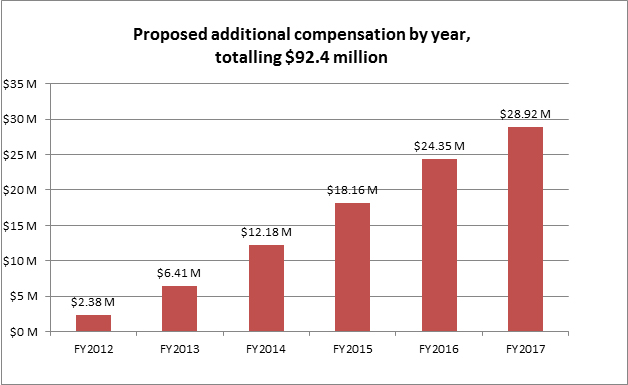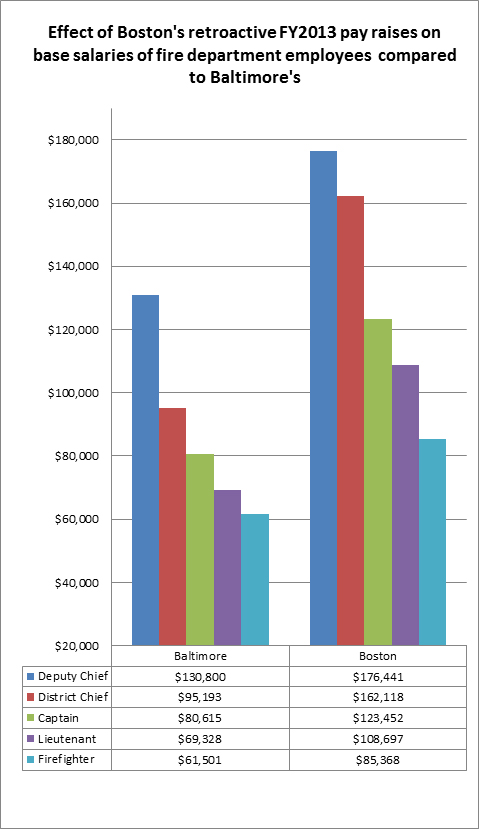Statement on Proposed City of Boston – Fire Department Collective Bargaining Agreement
This post was updated on May 7, 2014.
Pioneer Statement on the Proposed City of Boston – Fire Department Collective Bargaining Agreement If the proposed collective bargaining agreement between the City of Boston and the Boston firefighters union is approved, more than $20.97 million in retroactive paychecks will be paid out this summer and $71.43 million in extra compensation will be paid over the next three years, totaling $92.4 million, in a way that disproportionately benefits highly paid administrators and supervisors. This informational report sets forth details about who will get how much.
The proposed agreement has not been made public. However, city officials have disclosed in public comments that the tentative agreement reached by the mayor and the union includes retroactive raises of 1%, 2%, and 3% for FY2012, FY2013, and FY2014. It reportedly includes 3%, 3%, and 2% for FY2015, FY2016, and FY2017. City official said that the proposal also provides increases in hazardous duty pay, night time service pay, and career longevity incentives that add approximately an extra one-half of one percent each year to the those increases.
Pioneer Institute has applied these raises to Boston Fire Department salary data for calendar year 2013 published on the city’s website, The following charts and graphs demonstrate how much will be paid to fire department personnel if the collective bargaining contract is approved according to the terms described above. This data is based upon the assumption that employees have worked and will work the same number of regular and overtime hours in each year covered by the contract as they did in FY2013. When Pioneer Institute applied those percentage increases to published FY2013 compensation data, the resultant cost was $92.39 million, virtually the same as the city’s publicly-disclosed estimate of $92.4 million.
Pioneer provided an analysis last week of the yet-to-be disclosed collective bargaining agreement, predicated on the application of $92.39 million in compensation increases over the period of FY2011-FY2016. This revised analysis reflects further information indicating that the 1%, 2%, 3%, 3%, 3%, and 2% increases will respectively be applied to fiscal years 2012-2017, with an extra one-half percent added each year for hazardous duty pay, night time service pay, and career longevity incentives. This revised analysis is predicated on the same $92.39 in total compensation, but paid over the period of FY2012-FY2017 rather than FY2011-FY2016, resulting in a lesser amount of retroactive compensation increases and a greater amount of future compensation increases, but equaling in the same total amount of $92.39 million.
This analysis was performed by Pioneer Institute’s Research Director Gregory W. Sullivan, former state Inspector General of the Commonwealth.
The data below demonstrate that the collective bargaining agreement will add very high raises to compensation levels that are already very high.
A total of 256 fire department supervisors and administrators will be paid more beginning in July 2014 than the Massachusetts State Fire Marshal, who earns $137,985 per year, if the agreement is approved. A total of 148 will be paid more than the Governor, who earns $150,800.
Cumulatively, these officials will receive more than $20 million in extra compensation as a result of the collective bargaining agreement, which will provide a total of $92.4 million in extra compensation to all department employees. Read this report as pdf.
DOWNLOAD FULL EXCEL LIST HERE.
If the collective bargaining agreement is approved as described, fire department employees will receive retroactive checks this summer totaling a whopping $20,969,510 and additional increased compensation from FY2012-FY2017, including retroactive payments, of $92.4 million. The following chart lists how that money will be split up by Boston Fire Department job classifications, showing the average retroactive payment and average total increase compensation for each. It demonstrates that firefighters rank near the bottom, and top officials and managers at the top.
The following graph shows how much of the $92.4.million is attributed to the respective years of the contract, including retroactive periods.
The $92.4 million in extra compensation proposed by the collective bargaining agreement would be added to compensation levels that are already extraordinarily high. The following compares Boston’s compensation levels for fire department deputy chiefs, district chiefs, captains, lieutenants, and fire fighters with those of Baltimore. Baltimore and Boston are similar in population, with 621,342 and 636,479 residents respectively.
Pioneer Institute is committed to transparency in public contracting, especially for contracts of this magnitude and long-term significance.





